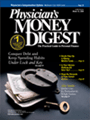O'Neil on Physicians and Investing
Physician's Money Digest
To gain advice for our readers, askedO'Neil how his strategies can beused by the medical professional. Here iswhat he had to say:
You mention that sometimes thesmartest people have the hardest timebecoming good investors because theycan't "defer to the market's opinioninstead of their own." How about physiciansas investors?
Many doctors are notoriously busy, sosome are mediocre investors. Their primarysource of investing information is listeningto tips from brokers or friends. Withtheir schedules, sometimes it's hard to dothe kind of homework that teaches soundinvesting rules and principles. It's critical tostudy past markets and listen to the factsthat are most relevant to making money inthe market. In other words, study is necessary.It's imperative the basics are in placebefore investing. Attend a workshop oninvesting. Our workshops usually have alot of doctors in attendance.
The Successful Investor seems toaddress active investors—those who arewilling to check on the market daily.Most physicians are extremely pressedfor time. What sort of commitment doesyour strategy require to work?
IBD
The IBDMonday Special.
It takes about 20 minutes a day—perhapsan hour or an hour and a half on theweekends. If you know CAN SLIM, thenyou're looking at the right things vs theless relevant information. The best way tofollow these strategies is with tools thatare geared toward searching out CANSLIM characteristics, such as . For thosewho are very busy, we've developed aweekly version of the newspaper,
In the book, you mention the importanceof reading charts. Which chartswould be most important for physician-investorsto read daily?
It's very important to view charts for aquick assessment of a stock's overall performance.There are some basic tradingpatterns that show up as stocks begin tobuild strength. We designed dailygraphs—both online and print versions—so that investors can check stocks quickly.Shut out all the tips and rumors fromfriends, and the news, which only createconfusion. If you follow a simple systemlike CAN SLIM, you don't really need anythingexcept the paper, charts, research,and archived company stories you can findon our Web site (www.investors.com).
All this stock information has beendesigned to provide concise reviews.Charts are a necessity, much like a physicaland a blood test. Some basic things mustbe checked out to understand the healthof your stock. A lot of what we believeabout the market is often wrong. If you'vebeen averaging 30% to 50% a year inreturns, then you're on track.
How would you profile the market?
As of this interview, we've been in theeighth month of a bull market, sinceMarch 2003. Historically, bull marketslast at least 1 1/2 years. What should youdo right now? Get the basic understandingdown—the background on howstocks really perform. You have to weedout opinion and remain focused.Recognize that most opinions arewrong.
